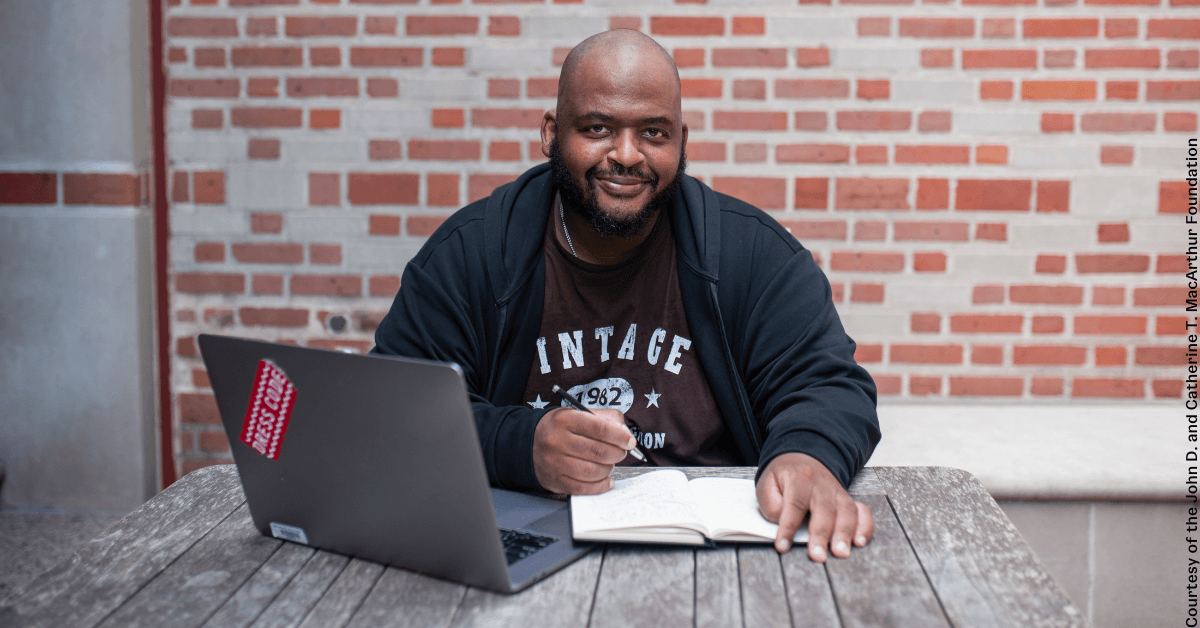KEY INSIGHTS:
- Kiese Laymon is the recipient of a 2022 MacArthur Fellowship, giving the writer and professor $800,000 over the next five years to further his work.
- He is bringing the Catherine Coleman Literary Arts and Justice Program from the University of Mississippi to Jackson State University.
- For the next month, he will match up to $50,000 in donations to the program.
Kiese Laymon is, through and through, a son of Jackson, Mississippi. The author of three award-winning books and recipient of a 2022 MacArthur Fellowship, known as the “Genius” grant, describes his mandate as being “to the South, to the Black South and to Mississippi.”
Now, he is bringing the Catherine Coleman Literary Arts and Justice Program back home to Jackson State University. Named after his grandmother, Laymon founded the program in 2020 while working at the University of Mississippi to help young people get more comfortable reading, writing, revising and sharing on their own terms and in their own communities.
“I was really born on that campus, like as a young kid I ran around on that campus,” Laymon, now a professor of English and creative writing at Rice University, told The Plug. His mother was a political science professor at JSU and had an office in historic Ayer Hall, the same building where Laymon’s literary program will now be housed at The Margaret Walker Center.
In committing to JSU, Laymon is not just honoring his grandmother, but emulating her. Born in 1929, Catherine Coleman stayed on her family’s land while most of her relatives fled the racial terror of the Jim Crow South. She committed to the land, built her own house and family, and though Coleman was denied an education, she sent all three of her daughters to JSU.
Through the Catherine Coleman Literary Arts and Justice Program, high school students from around Mississippi come together in “safe and generative” creative writing workshops led by graduate students and soon, JSU upperclassmen, Laymon said. At the end of the workshops, the students’ work is published.
At its core, the program is about the same three things Coleman was devoted to — fellowship, food and revision.
“Young people are going to be learning how to tell stories and revising stories and we’re going to be getting some good fresh food from people who make food around Jackson, Mississippi, to come talk to the kids about the art of making whatever they’re gonna be eating that day,” he said. “It’s just something that is born of my grandmother’s art, the art of being her.”
The initiative will be up and running at JSU in Spring 2023 and will have a summer component.
MacArthur Fellowship helping further Laymon’s work
Each year, the MacArthur Foundation chooses a select group of scientists, scholars, writers and artists for a life-changing grant of $800,000, disbursed over five years. The money has no strings attached.
Though Laymon had been working on moving his literary program to JSU before the MacArthur was announced, once he found out that he would be one of this year’s recipients, he recognized the prestige and attention from the award would be a boon.
On October 12, just hours after the MacArthur Foundation released the list of 2022 Fellows, Laymon announced the move of the center and that for the next month, he was matching up to $50,000 in donations. He will also match $50,000 every year until the program is endowed.
It is just one of the ways that he is using the MacArthur fellowship to fulfill what he feels is a mandate to his home state of Mississippi. But he is grappling now with what this windfall means to his life and his work centered around the Black experience, generational poverty and trauma.
“I feel lucky, but I also feel sort of anxious about what direction the work goes in now that it’s been acknowledged in that way,” Laymon said.
“I think to front like I’m the same dude before $800,000 — I mean, I probably am but I shouldn’t be. Like I can do some s*** now that before I couldn’t do and I can help some people now that I couldn’t help and I have a cushion now that I didn’t have. So I think that’s going to impact the work somehow, but I’m just not sure how.”
But Laymon is, through and through, a son of Jackson, Mississippi, and he feels his winning this award by writing in a way that was authentic to his experience and people encapsulates the genius and talent of the city.
“I know people feel like, ‘Of course my boy won one of [the MacArthur grants], because he’s from us,’” he said. “I don’t know what the money is gonna mean in terms of Black abundance, but I know my getting it is exactly, it’s Black abundance.”








